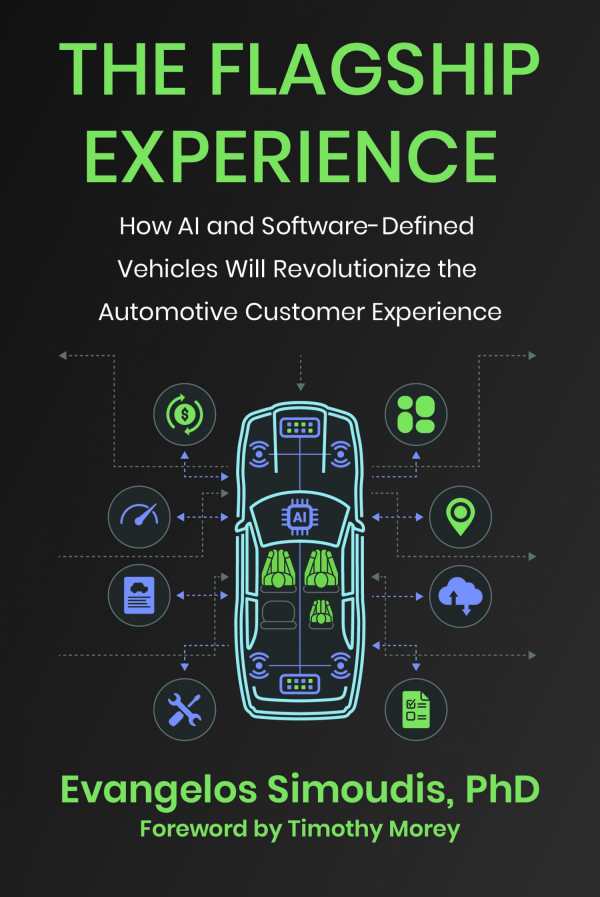The Flagship Experience
How AI and Software-Defined Vehicles Will Revolutionize the Automotive Customer Experience
The Flagship Experience is an informed optimist’s guide to forthcoming automotive industry transformations.
A work that’s ahead of its time, Evangelos Simoudis’s The Flagship Experience suggests a framework for innovation in the software-defined vehicle space.
The book predicts that factors such as growing pressures from environmentalists and governments to curb emissions from traditional internal combustion engine vehicles, fierce international and domestic competition, and automation will lead to drastic changes in the landscape of the automobile industry. Those in the industry face the choice to either innovate or perish, it says. Its tone urgent, it extrapolates from contemporary industry trends to project rates of progress into the future.
The proposed solutions to problems that are just beginning to make themselves known—and others that have yet to arise—are novel. The text sheds light on the current and future states of the industry, making use of insider insights to complement its proposed strategies for adapting and reinventing company procedures to keep abreast of trends toward automation and a wide-scale shift toward electric vehicles. For example, when exploring the last two large-scale, industry-disrupting innovations in the history of automobiles—both vehicle-centric—the text posits that the next large-scale shift in the industry will be customer-centric: automotive companies, it supposes, will need to monetize throughout the lifetime of their customers’ vehicles.
It muses its way through potential responses with clarity, including subscription-based services, competitive insurance rates for safe drivers, enhanced cybersecurity features for parents of small children, and subscriptions to virtual helpers that would allow drivers to choose from the safest, fastest, most energy-efficient, and least expensive routes. However, the method of aggressive data collection and robust data analysis described poses ethical concerns that are not addressed in a satisfactory manner, including those related to hacker exploitation.
But the book’s forward-looking arguments are well-grounded in its thorough coverage of industry trends. It draws on predictions by and conversations with professionals in various high-level roles, including GM’s chief experience officer and the senior vice president of development for BMW’s Connected Company. Its suppositions thus come across as logical—based on the available information about the current rate of technological progress. Its timeline bespeaks optimism, and the changes that it describes are made to seem imminent.
Peeking into the automotive industry with the benefit of data as its support, The Flagship Experience predicts future industry trends and makes recommendations to industry professionals who are looking to lean into change and shift toward innovation.
Reviewed by
Caitlin Cacciatore
Disclosure: This article is not an endorsement, but a review. The publisher of this book provided free copies of the book and paid a small fee to have their book reviewed by a professional reviewer. Foreword Reviews and Clarion Reviews make no guarantee that the publisher will receive a positive review. Foreword Magazine, Inc. is disclosing this in accordance with the Federal Trade Commission’s 16 CFR, Part 255.

